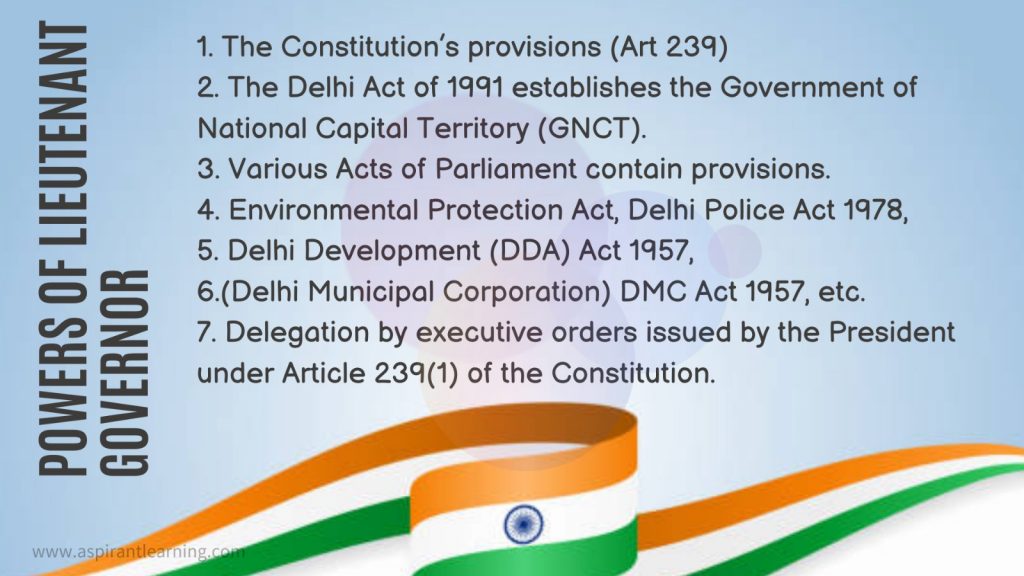News Highlights:
Recently, The Supreme Court orally observed the legality behind the Lieutenant Governor (L-G) act “without aid and advice” of the Council of Ministers in nominating 10 members to the Municipal Corporation of Delhi.
Timeline of the Dispute:
- 2017 Judgement:
- The Delhi High Court had, in its judgment of 2017, held that for administration purposes of the National Capital Territory (NCT), the Lieutenant Governor (L-G) is not bound by the aid and advice of the Council of Ministers in every matter.
- On appeal, the SC, in 2017, referred the matter to decide the interpretation of Article 239AA of the Constitution.
- 2018 Judgement:
- A five-judge Constitution bench had unanimously held that the L-G of Delhi is bound by the aid and advice of the elected government, and both needed to work harmoniously with each other.
- 2019 Judgement:
- A two-judge Bench of the SC delivered a split verdict on the question of powers of the Government of NCT of Delhi and the Union government over services. It referred the matter to a three-judge Bench.
- While one judge ruled, the Delhi government has no power at all over administrative services.
- Another judge, however, had said the transfer or posting of officers in top echelons of the bureaucracy (joint director and above) could only be done by the Central government, and the view of the L-G would prevail in case of a difference of opinion for matters relating to other bureaucrats.
- 2022 Case:
- The Centre on 27th April 2022 sought a reference to a larger Bench, arguing that it needed the power to make transfers and postings of officers in Delhi because it was the national capital and the “face of the nation”.
- The court agreed that the limited question relating to the scope of the legislative and executive powers of the Centre and NCT of Delhi concerning the term “services” would need an authoritative pronouncement by a Constitution Bench in terms of Article 145(3) of the Constitution.
Governance Model of New Delhi:
- Overview:
- The status of Delhi is a Union Territory under Schedule 1 of the Constitution but christened the ‘National Capital Territory’ under Article 239AA.
- The 69th amendment to the Constitution of India inserted Article 239AA, which declared the Union Territory of Delhi to be administered by an L-G who works on aid and advice of the elected legislative assembly.
- However, the ‘aid and advice’ clause pertains only to matters on which the elected Assembly has powers under the State and Concurrent Lists except for public order, police, and land.
- Further, Article 239AA also notes that L-G has to either act on the aid and advice of the Council of Ministers or he is bound to implement the decision taken by the President on a reference being made by him.
- Also, Article 239AA empowers the L-G to refer a difference of opinion on ‘any matter’ with the Council of Ministers to the President.
- Thus, this dual control between L-G and the elected government leads to a power tussle.

The Lieutenant Governor
- Constitutional provisions:
- Under Article 239 of the Constitution of India, the administration of UTs is handled by an administrator appointed by the President of India.
- However, the Constitution (Sixty-ninth Amendment) Act, 1991, introduced Article 239AA, which created an elected Legislative Assembly and a Council of Ministers, including a Chief Minister for NCT Delhi.
- This Assembly has the power to make laws for NCT Delhi concerning any of the matters under the State or Concurrent Lists (except public order, police and land matters).
- The Lieutenant Governor (LG) of Delhi was designated the Administrator of the NCT Delhi.
- Powers of Lieutenant Governor:
- He/She acts on the aid and advice of the Council of Ministers, except when he/she is compelled to act at his/her discretion.
- If the LG and the Ministers disagree on any issue, the LG shall refer it to the President for decision and act accordingly.
- When such a decision is pending with the President, it shall be competent for the LG to take prompt action in any scenario where the matter (in his opinion) is urgent.
- Under Article 239AB, the President may, on receipt of a report from the LG or otherwise, suspend the operation of any provision of Article 239AA by order when a situation arises in which the administration of the NCT cannot be carried out following the provisions of Article 239AA.
Pic Courtesy: Freepik
Content Source: The Hindu



